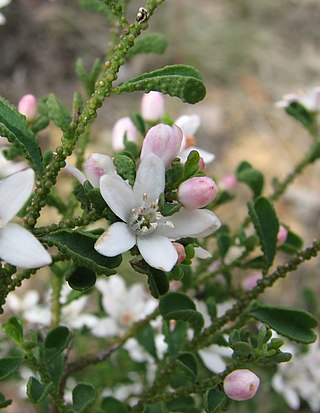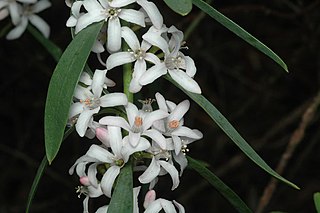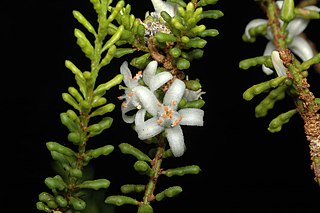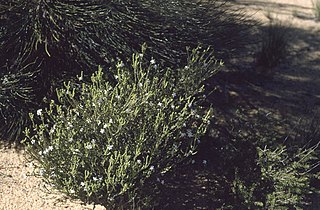
Philotheca verrucosa, commonly known as fairy wax-flower or Bendigo wax-flower, is a species of flowering plant in the family Rutaceae and is endemic to south-eastern Australia. It is a small shrub with prominently glandular-warty branchlets, heart-shaped or egg-shaped leaves with the narrower end towards the base, and white flowers usually arranged singly in leaf axils.

Philotheca salsolifolia is a species of flowering plant in the family Rutaceae and is endemic to New South Wales and the Australian Capital Territory. It is a shrub with crowded, more or less cylindrical leaves and pink to mauve flowers with a dark central stripe and arranged singly or in twos or threes on the ends of branchlets.

Philotheca conduplicata is a species of flowering plant in the family Rutaceae and is endemic to eastern Australia. It is a shrub with elliptical leaves clustered near the ends of the branchlets and white flowers arranged singly or in two or threes on the ends of the branchlets.
Philotheca cuticularis is a species of flowering plant in the family Rutaceae and is endemic to Queensland. It is a rounded shrub with small, crowded leaves and small white flowers arranged singly on the ends of branchlets.

Philotheca cymbiformis is a species of flowering plant in the family Rutaceae and is endemic to the south-western area of Western Australia. It is a low, spreading small shrub with fleshy, narrow elliptic leaves and single white and reddish brown flowers on the ends of branchlets.

Philotheca epilosa is a species of flowering plant in the family Rutaceae and is endemic to eastern Australia. It is a shrub with egg-shaped to lance-shaped leaves with the narrower end toward the base and crowded near the ends of the glandular-warty branchlets, and white flowers usually arranged singly on the ends of the branchlets.
Philotheca ericifolia is a species of flowering plant in the family Rutaceae and is endemic to New South Wales. It is a much-branched shrub with glandular-warty branchlets, needle-shaped leaves and white to pink flowers arranged singly or in groups of up to six on the ends of the branchlets.
Philotheca falcata, commonly known as the sickle-leaved waxflower, is a species of flowering plant in the family Rutaceae and is endemic to a small area in the south-west of Western Australia. It is a small, densely branched shrub with narrow club-shaped leaves and single flowers on the ends of branchlets.
Philotheca fitzgeraldii is a species of flowering plant in the family Rutaceae and is endemic to the south of Western Australia. It is an erect, compact or spreading shrub with cylindrical, glandular-warty leaves and white flowers arranged singly in leaf axils and on the ends of branchlets.
Philotheca glabra is a species of flowering plant in the family Rutaceae and is endemic to the inland south-west of Western Australia. It is a small shrub with elliptical to club-shaped leaves and white flowers tinged with pink and arranged singly or in twos or three on the ends of branchlets.
Philotheca nutans is a species of flowering plant in the family Rutaceae and is endemic to the south-west of Western Australia. It is a small, densely-branched shrub with club-shaped to cylindrical, glandular-warty leaves and pendent, pale yellow to pale red flowers arranged singly in leaf axils.

Philotheca pachyphylla is a species of flowering plant in the family Rutaceae and is endemic to Western Australia. It is a small shrub with fleshy, oblong, prominently glandular-warty leaves and white flowers arranged singly in leaf axils.

Philotheca pinoides is a species of flowering plant in the family Rutaceae and is endemic to the south-west of Western Australia. It is a small, erect undershrub with needle-shaped, glandular-warty leaves and pale pink or red flowers arranged singly or in groups of up to three in the axil of leaves at the end of branchlets.

Philotheca scabra is a species of flowering plant in the family Rutaceae and is endemic to New South Wales. It is a small shrub with variably shaped leaves, depending on subspecies, and single white to pink flowers arranged on the ends of branchlets.

Philotheca sericea is a species of flowering plant in the family Rutaceae and is endemic to the south-west of Western Australia. It is an undershrub with small oval to elliptical leaves and white to pink flowers usually arranged singly at the end of branchlets.

Philotheca sporadica, commonly known as Kogan waxflower, is a species of flowering plant in the family Rutaceae and is endemic to south-eastern Queensland. It is a shrub with small, narrow oval leaves with the narrower end toward the base and white flowers with a pink midrib, usually arranged singly on the ends of branchlets.

Philotheca thryptomenoides is a species of flowering plant in the family Rutaceae and is endemic to the south-west of Western Australia. It is a small undershrub with oval to club-shaped leaves and white flowers with a broad, reddish-brown stripe, arranged singly on the ends of branchlets.

Philotheca tomentella is a species of flowering plant in the family Rutaceae and is endemic to the south-west of Western Australia. It is an undershrub with small club-shaped to cylindrical leaves and white flowers with a pale red central stripe, arranged singly or in groups of up to four on the ends of branchlets.

Philotheca virgata, commonly known as Tasmanian wax-flower, is a species of flowering plant in the family Rutaceae and is endemic to south-eastern Australia. It is a slender, erect shrub with wedge-shaped to oblong leaves and white or pale pink flowers at the ends of branchlets. It is the only philotheca with four sepals and petals.
Philotheca wonganensis, commonly known as Wongan philotheca, is a species of flowering plant in the family Rutaceae and is endemic to the south-west of Western Australia. It is a shrub with thin, cylindrical leaves and white flowers with a pink central stripe, usually arranged singly in leaf axils.













